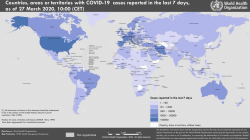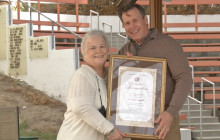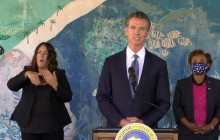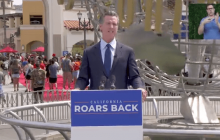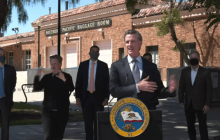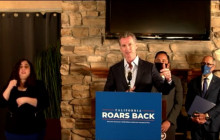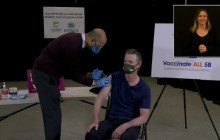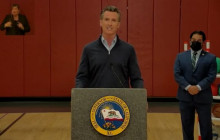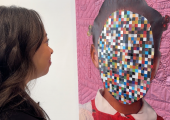|
World Health Organization briefing for Friday, March 27, 2020, Geneva, Switzerland. “One of the most important areas of international cooperation is research and development.” “A vaccine is still at least 12 to 18 months away.”
Prepared Opening Remarks Good morning, good afternoon and good evening, wherever you are. There are now more than half a million confirmed cases of COVID-19 and more than 20,000 deaths. These are tragic numbers, but let’s also remember that around the world, more than 100,000 people have recovered. Yesterday, I had the honour of addressing an extraordinary meeting of leaders from the G20 countries. My message was threefold: we must fight, unite and ignite. Fight to stop the virus with every resource at our disposal; Unite to confront the pandemic together. We are one humanity, with one, common enemy. No country can fight alone; we can only fight together. And ignite the industrial might and innovation of the G20 to produce and distribute the tools needed to save lives. We must also make a promise to future generations, saying never again. Viral outbreaks are a fact of life. How much damage they do is something we can influence. I thank the G20 countries for their commitment to fight the pandemic, safeguard the global economy, address international trade disruptions and enhance global cooperation. This is especially important for countries who are not part of the G20 but will be affected by decisions made by G20 countries. Earlier today, we held a briefing with around 50 Ministers of Health from around the world at which China, Japan, the Republic of Korea and Singapore shared their experiences and the lessons they have learned. Several common themes emerged about what has worked: The need for early detection and isolation of confirmed cases; Identification, follow-up and quarantine of contacts; The need to optimize care; And the need to communicate to build trust and engage communities in the fight. Countries also expressed several common challenges. The chronic global shortage of personal protective equipment is now one of the most urgent threats to our collective ability to save lives. WHO has shipped almost 2 million individual items of protective gear to 74 countries that need it most, and we’re preparing to send a similar amount to a further 60 countries. But much more is needed. This problem can only be solved with international cooperation and international solidarity. When health workers are at risk, we’re all at risk. Health workers in low- and middle-income countries deserve the same protection as those in the wealthiest countries. To support our call on all countries to conduct aggressive case-finding and testing, we’re also working urgently to massively increase the production and capacity for testing around the world. One of the most important areas of international cooperation is research and development. A vaccine is still at least 12 to 18 months away. In the meantime, we recognize that there is an urgent need for therapeutics to treat patients and save lives. Today we are delighted to announce that in Norway and Spain, the first patients will shortly be enrolled in the Solidarity Trial, which will compare the safety and effectiveness of four different drugs or drug combinations against COVID-19. This is a historic trial which will dramatically cut the time needed to generate robust evidence about what drugs work. More than 45 countries are contributing to the trial, and more have expressed interest. The more countries who join the trial, the faster we will have results. In the meantime, we call on individuals and countries to refrain from using therapeutics that have not been demonstrated to be effective in the treatment of COVID-19. The history of medicine is strewn with examples of drugs that worked on paper, or in a test tube, but didn’t work in humans or were actually harmful. During the most recent Ebola epidemic, for example, some medicines that were thought to be effective were found not to be as effective as other medicines when they were compared during a clinical trial. We must follow the evidence. There are no short-cuts. We also need to ensure that using unproven drugs does not create a shortage of those medicines to treat diseases for which they have proven effective. As the pandemic evolves and more countries are affected, we are learning more and more lessons about what works and what doesn’t. WHO is continuing to support all countries in the response. We’ve published more than 40 guidance documents on our website, providing detailed, evidence-based recommendations for governments, hospitals, health workers, members of the public and more. More than 1 million health workers have been trained through our courses on OpenWHO.org. We will continue to train more. We’re also delighted to report that the COVID-19 Solidarity Fund has now received donations of more than US$ 108 million in just two weeks, from 203,000 individuals and organizations. Thank you to each and every one of you. The English version of our WhatsApp Health Alert now has more than 12 million users globally, and the Arabic, French and Spanish versions were launched today. More languages will be added, including Bangla, Chinese, Hindi, Kurdish, Portuguese, Russian, Somali, Urdu, Swahili and more. I’ve said before that crises like this bring out the best and worst in humanity. We have recently seen an increase in scams, cyberattacks and impersonation using WHO, my name and COVID-19. I am very grateful to those working in various national organizations providing critical cybersecurity intelligence to the WHO Cybersecurity team. Thank you for your efforts to work with us to protect the health systems, health workers and members of the general public who rely on our information systems and digital tools. Special thanks to Microsoft for assisting on this. I’d like to end with something Singapore’s Minister of Health, Gan Kim Yong, said during today’s briefing. We are only at the beginning of this fight. We need to stay calm, stay united and work together. I thank you. |
